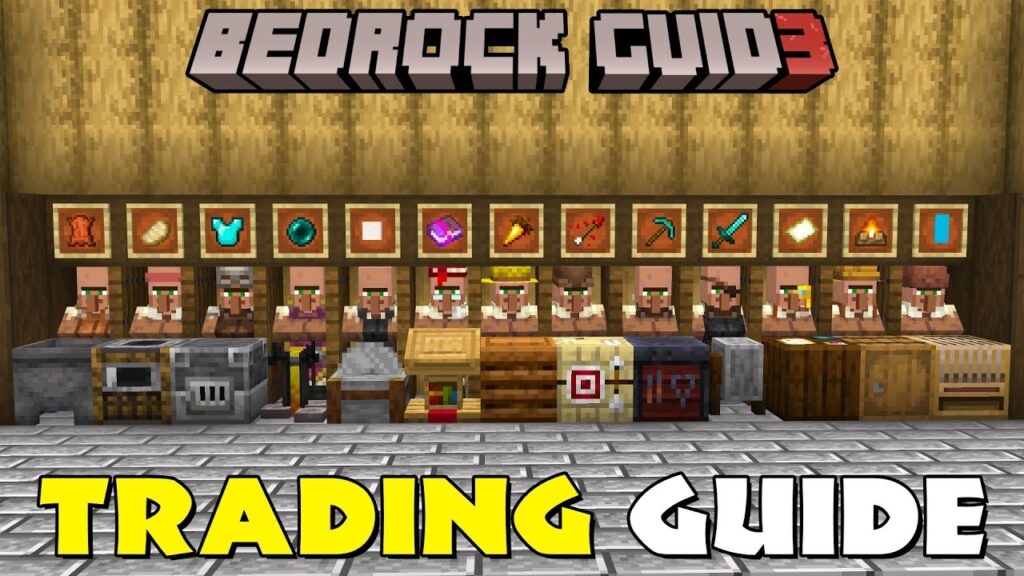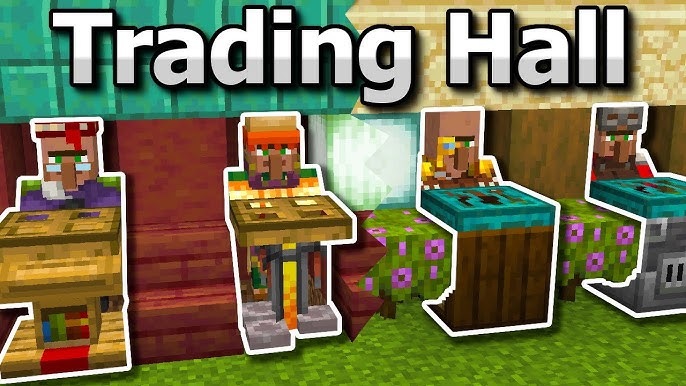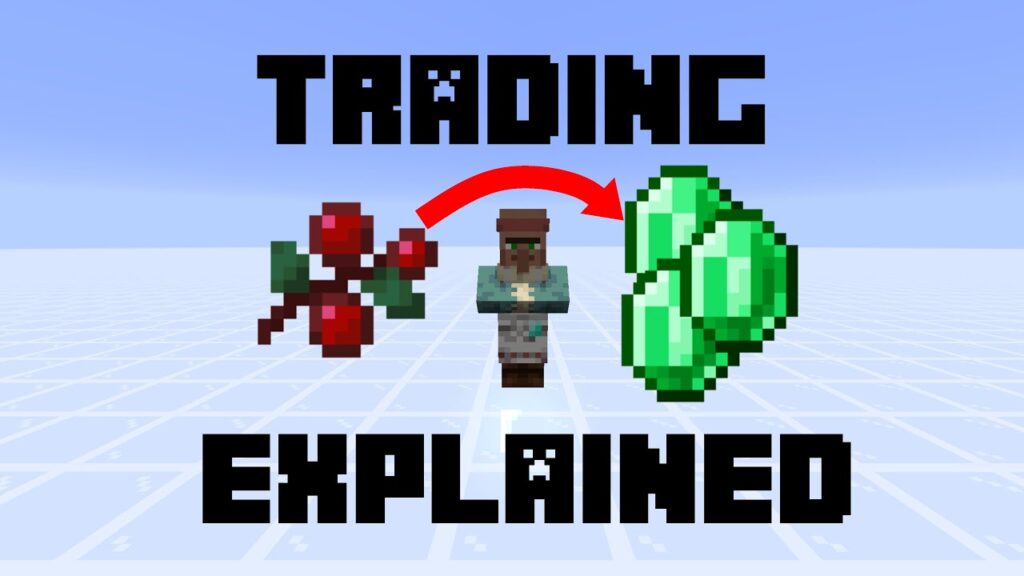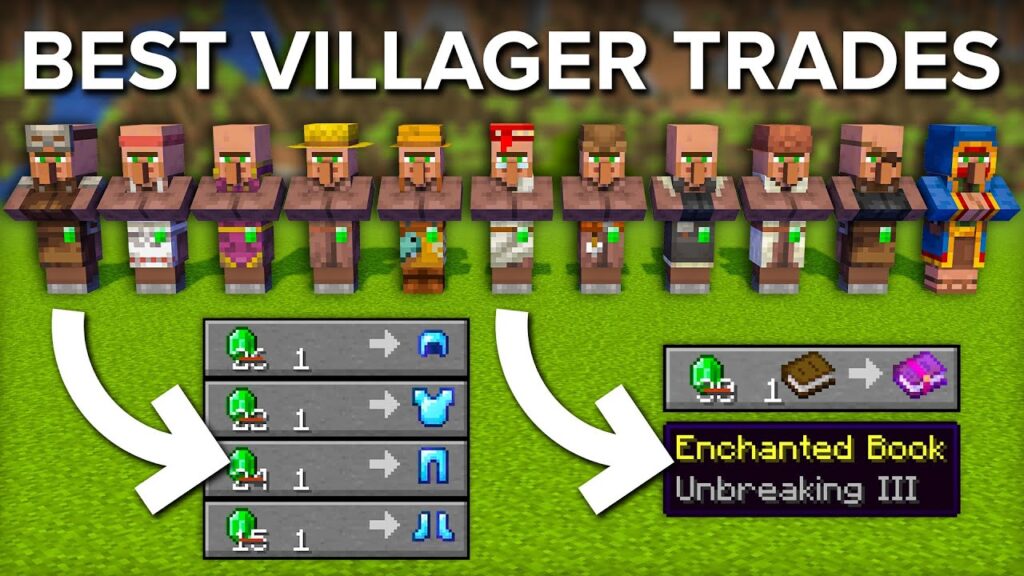Minecraft Villager Trades, blocky world of Minecraft, villagers play an essential role in helping players acquire rare items, resources, and tools. These friendly, non-playable characters (NPCs) inhabit villages scattered across the game’s biomes, offering a unique mechanic—trading. Villager trades provide players with valuable resources, often saving time and effort in gathering or crafting items manually. Understanding how to maximize the efficiency of villager trades is key to success in Minecraft, especially for those striving to conquer survival mode or build large-scale projects.
In this guide, we will dive deep into the world of Minecraft Villager Trades villager trades, covering everything from how trades work and how to level up villagers to tips on optimizing trade efficiency and the importance of various villager professions.
What Are Villager Trades?
Villager trades are transactions between the player and villagers, where the player offers items in exchange for goods. Villagers, depending on their profession, will trade a variety of items ranging from simple resources like food and building materials to rare enchanted gear and tools. Villagers use emeralds as their primary currency, so players will need to gather emeralds either by mining, finding them in loot, or trading to initiate trades with villagers.

The trades available to a player will vary depending on the villager’s profession and their experience level in that profession.
Villager Professions and Their Trades
Villagers can have different professions based on their job site block, each associated with specific types of trades. Below is a breakdown of the key professions and the kinds of trades they offer:
Farmer (Composter)
The Farmer is one of the most accessible villagers for trades, often found in almost every village. Farmers trade items related to food and farming, such as:
- Early Trades: Wheat, carrots, potatoes, beetroot (in exchange for emeralds).
- Later Trades: Pumpkin pies, golden carrots, suspicious stew, and cakes.
Farmers are invaluable in obtaining large amounts of food quickly, which is particularly helpful when you need a reliable food source during long mining or building sessions.
Librarian (Lectern)
Librarians are highly sought after by players because they offer enchanted books, one of the most powerful items in the game. They also trade for paper, books, and other resources related to enchanting and knowledge. Their key trades include:

- Early Trades: Books, paper, and lanterns.
- Later Trades: Enchanted books (with enchantments like Mending, Fortune, Unbreaking, Efficiency), name tags, and clocks.
A player can reset a Librarian’s trades by breaking and replacing the lectern, which allows players to cycle through enchantments until they find the desired book, such as the highly coveted Mending enchantment.
Armorer (Blast Furnace)
The Armorer specializes in trading gear, providing essential iron armor early in the game and powerful enchanted diamond armor as they level up. Their trades include:
- Early Trades: Coal, iron ingots, and basic iron armor.
- Later Trades: Enchanted diamond armor (helmet, chestplate, leggings, and boots).
Trading with an Armorer can save players hours of mining and crafting, especially if they want access to enchanted diamond gear without venturing deep into dangerous mines.
Toolsmith (Smithing Table)
A Toolsmith offers valuable tools such as pickaxes, axes, and shovels. Like the Armorer, the Toolsmith offers better trades as they level up. Notable trades include:
- Early Trades: Coal, emeralds, iron tools.
- Later Trades: Enchanted diamond tools like pickaxes and axes.

The Toolsmith is especially useful for players who want a steady supply of powerful tools to expedite mining and building projects.
Weaponsmith (Grindstone)
Weaponsmiths, as the name suggests, trade weapons, including swords and axes. Their trade progression mirrors that of other smithing professions:
- Early Trades: Coal, iron swords, and axes.
- Later Trades: Enchanted diamond swords and axes.
Having a Weaponsmith nearby ensures you always have access to a reliable and powerful weapon, which can be life-saving during combat or raids.
Fletcher (Fletching Table)
Fletchers trade bows, arrows, and crossbows, making them crucial for ranged combat specialists. Fletchers also trade flint and sticks for emeralds, a great way to accumulate emeralds early in the game. Their notable trades include:
- Early Trades: Sticks, flint, and arrows.
- Later Trades: Enchanted bows, enchanted crossbows, and tipped arrows.
For players who prefer combat from a distance, the Fletcher offers quick access to high-damage ranged weapons and supplies.
Cleric (Brewing Stand)
The Cleric deals in magical items and resources essential for potion brewing. Clerics often offer items that are otherwise hard to come by, such as:
- Early Trades: Rotten flesh (exchange for emeralds), redstone, lapis lazuli.
- Later Trades: Ender pearls, bottles of enchanting, glowstone, and other rare items.
The Ender pearls are essential for progressing through the game and locating strongholds, making the Cleric a key villager in preparing for the Endgame.
Cartographer (Cartography Table)
The Cartographer specializes in maps and exploration. Their early trades focus on paper and compasses, while later trades include:
- Early Trades: Paper, compasses.
- Later Trades: Ocean explorer map, woodland explorer map, banner patterns.
The explorer maps are extremely useful for discovering rare and valuable locations like woodland mansions and ocean monuments.
Villager Levels and Trade Progression
Villagers start at the Novice level and can progress through several stages—Apprentice, Journeyman, Expert, and Master. As villagers level up, the range and quality of their trades improve. Here’s how the progression works:
- Novice: Offers basic trades; useful for acquiring food, coal, and simple tools.
- Apprentice: Better items like iron gear or enchanted books begin appearing.
- Journeyman: More advanced trades with better items, including higher-tier weapons or gear.
- Expert: Access to rare and powerful items, like enchanted gear.
- Master: Best items available, often offering enchanted diamond armor, weapons, and tools.
Each time you trade with a villager, they gain experience. This helps them level up and unlock new, more valuable trades. A villager’s profession can only be changed while they are still a Novice, meaning you can reset their trades by breaking their job site block before they level up.
How to Unlock and Maximize Villager Trades
Curing Zombie Villagers
Zombie villagers can be cured using a splash potion of Weakness and a golden apple. Once cured, these villagers will offer significantly discounted trades, often dropping their prices to a single emerald per item. This strategy can save a tremendous amount of resources, especially when dealing with expensive trades like enchanted books or diamond armor.
Discounts through Hero of the Village
The Hero of the Village effect is gained by defending a village during a Raid. Once you’ve successfully fended off waves of pillagers, the villagers will reward you with discounts on their trades. This effect can be a game-changer, particularly when combined with cured zombie villagers for incredibly low trade costs.
Creating Villager Trading Halls
A Villager Trading Hall is an efficient setup where multiple villagers of different professions are housed together in one area. This allows you to access many trades in a confined space without having to roam a village. By assigning each villager a specific workstation, you can control which trades they offer. It’s also common to have backup villagers or methods to reset trades (like swapping workstations) until you get the best possible deals.
Emerald Farming: How to Accumulate Emeralds Fast
Emeralds are the backbone of villager trades, and having a reliable source is essential. Here are a few tips to farm emeralds efficiently:
- Farming and Trading: Farmers often offer trades for common crops like wheat, carrots, and potatoes. Setting up an automated farm can supply you with an endless source of crops to trade for emeralds.
- Stick Trading: Fletchers offer trades where they will exchange sticks for emeralds. You can farm sticks by cutting down trees and turning the logs into planks and sticks, giving you an abundant, renewable way to gather emeralds.
- Raids: Defeating pillagers in raids will sometimes drop emeralds. With the Hero of the Village effect, you also get better trades from the surviving villagers.
FAQ
How do I unlock new trades with villagers?
To unlock new trades with a villager, you need to trade with them. Each time you trade, the villager gains experience, and as they level up (from Novice to Master), new trades become available. The more you trade, the better their offerings become.
Can I change a villager’s profession?
Yes, you can change a villager’s profession if they are still at the Novice level and haven’t been traded with. Simply break their current job site block and place a new one (like a Lectern for a Librarian). They will switch professions and offer new trades based on the new job site.
What is the best way to get emeralds for villager trades?
Farming crops like wheat, potatoes, and carrots and trading them with Farmers is a reliable way to gather emeralds. Fletchers also offer emeralds for sticks, which can be farmed by harvesting wood. You can also cure zombie villagers for discounts or participate in raids to earn the Hero of the Village status, which gives trade discounts.
Why are my villagers not offering new trades?
If a villager stops offering new trades, they may need to restock. Villagers restock their trades twice a day by accessing their job site block. Ensure their workstation isn’t obstructed and that they can reach it during their working hours.
How can I get rare enchanted books like Mending?
To get rare enchanted books, trade with Librarians. You can reset a Librarian’s trade offers by breaking and replacing the Lectern until they offer the enchantment you desire, such as Mending or Fortune.
Conclusion
Mastering villager trades in Minecraft Villager Trades is an essential skill that can significantly enhance your gameplay. Whether you’re looking to quickly gather resources, access rare enchanted items, or unlock powerful gear, trading with villagers is a reliable way to get what you need. By understanding how villager professions work, how to level them up, and how to optimize your trading strategies, you can streamline your progress in the game and take your Minecraft Villager Trades world to the next level.
So next time you visit a village, take advantage of those trades and watch your resources grow, helping you on your journey to survival, building, and ultimate victory!

